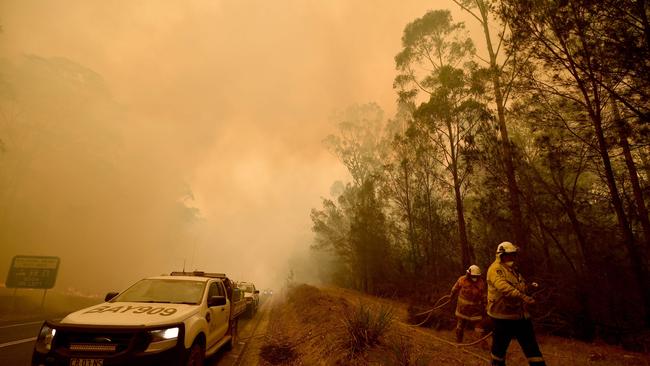Inferno forces investor rethink
The bushfires will force investors to rethink their exposures to industries and businesses vulnerable to climate change risk.

The bushfires ripping their way through Australia’s east coast will force investors to rethink their exposures to industries and businesses vulnerable to climate change risk, with some adjusting their return expectations and others reconsidering the merits of remaining invested in such sectors at all, according to fund managers.
It comes as Westpac put total losses to date from the bushfires at around $5bn — higher than the 2009 bushfires in Victoria but less than the Queensland floods in 2010-11 — while ratings agency Moody’s Investors Service warned of the increasing risk facing residential mortgage-backed securities as a result of more frequent natural disasters.
“It’s a wake-up call for investors that climate change is a reality. There’s no point debating what’s causing it. It is a reality and you therefore have to allow for that in your investment strategy,” AMP head of investment strategy Shane Oliver told The Weekend Australian.
“I think investors will look at (the risk premium) a little more carefully from now on. If you argue the bushfire season is getting longer, which it does seem to be … then this is probably going to become a bigger threat through time. It’s a reminder that investors need to be more conscious of it.”
Super funds are among those modifying their return forecasts from investments at risk due to climate change.
“We’ve looked at all of the asset classes, and we’ve adjusted our return expectation from all of them that we think are at risk,” Hostplus chief investment officer Sam Sicilia, who oversees $42bn of funds, told The Weekend Australian.
“What that means, in practice, is instead of expecting a 9 per cent return, it will be 8.1 per cent, or 7.6 per cent, or 5.2 per cent … and if those industries no longer generate the return that you need to compensate you for the risk, then you won’t be investing in them.”
Agriculture, tourism and retail are forecast to be hardest hit by the bushfire crisis, which has ravaged more than 11 million hectares and destroyed livestock and homes across the affected regions.
Dairy processor Bega Cheese earlier this week confirmed the fires had affected a number of its milk suppliers in the region, raising fears of a milk shortage.
Insurers have received more than 10,000 claims, with an estimated loss value of $939m, putting their profits at risk and heaping pressure on future premium rates, analysts have warned.
Ratings agency S&P earlier this week flagged that claims from the bushfires would exceed insurers’ usual natural peril allowances.
“The events could also pressure premium rates in future as insurers are forced to pass on likely higher reinsurance costs,” S&P said in an analysis of the disaster.
Bennelong Australian Equity Partners chief investment officer Mark East said the fund may look more closely at climate risks when assessing investments. “The bushfires have highlighted risks for certain companies: some of the agricultural stocks, such as the wine companies or Freedom Foods, or Bega. Insurers too. You’d have to take that into account when looking into companies to invest,” he said.
“We wouldn’t expect to see fires of this magnitude every year but if it was a risk every year we’d have to consider whether we wanted exposure to this company or industry.”
But Investors Mutual portfolio manager Daniel Moore said his key concern was the affordability of higher premiums.
“The insurance sector is quite a consolidated sector, so while you’ll see higher claims costs in a certain year, you’ll likely see an increase in premiums reflecting that the following year. The bushfires are obviously awful and devastating, but from a corporate perspective it’s more of a short-term impact.
“Because it’s a rational sector, insurance companies can just put up their premiums to cover higher claims costs. But affordability will become an issue at some point.”
The cautious message comes as the world’s largest asset manager, BlackRock, signed to Climate Action 100+, a group of investors managing assets worth more than $US35 trillion that pressures the world’s largest corporate greenhouse gas emitters to take action on climate change.
The US investment firm, which manages $6.9 trillion of assets including some in Australia, said becoming a signatory was a “natural progression” of the work it had done to date.
“We believe evidence of the impact of climate risk on investment portfolios is building rapidly and we are accelerating our engagement with companies on this critical issue,” the statement said.



To join the conversation, please log in. Don't have an account? Register
Join the conversation, you are commenting as Logout